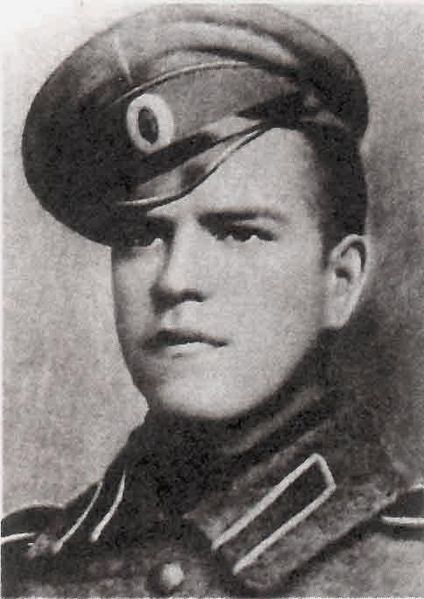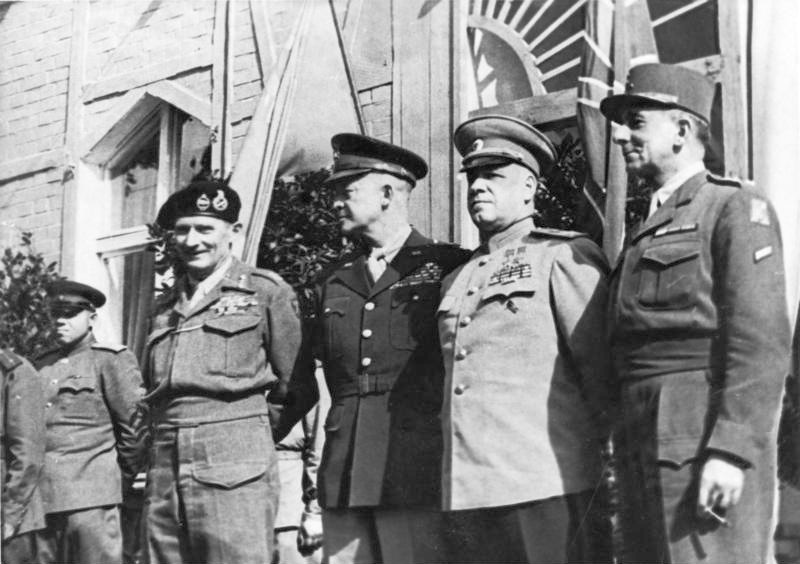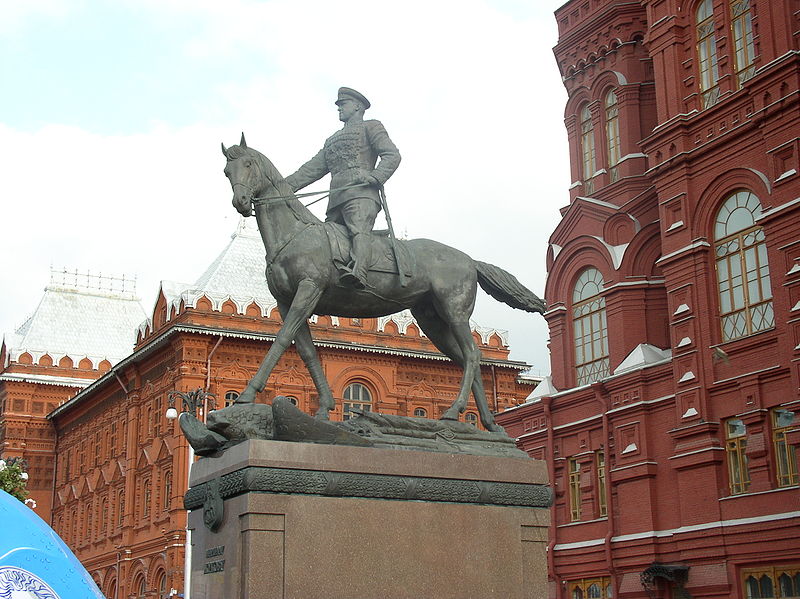<Back to Index>
- Mathematician Nikolai Ivanovich Lobachevsky, 1792
- Architect Minoru Yamasaki, 1912
- Marshal of the Soviet Union Georgy Konstantinovich Zhukov, 1896
PAGE SPONSOR


Marshal of the Soviet Union Georgy Konstantinovich Zhukov (Russian: Гео́ргий Константи́нович Жу́ков; December 1 [O.S. November 19] 1896 – June 18, 1974) was a Russian career officer in the Red Army who, in the course of World War II, played a pivotal role in leading the Red Army through much of Eastern Europe to liberate the Soviet Union and other nations from the Axis Powers' occupation and conquer Germany's capital, Berlin. He is the most decorated general in the history of both Russia and the Soviet Union.
Born into a poverty-stricken peasant family in Strelkovka, Maloyaroslavsky Uyezd, Kaluga Governorate (now merged into the town of Zhukov in Zhukovsky Raion of Kaluga Oblast in modern-day Russia), Zhukov was apprenticed to work as a furrier in Moscow, and in 1915 was conscripted into the army of the Russian Empire, where he served first in the 106th Reserve Cavalry Regiment, then the 10th Dragoon Novgorod Regiment. During World War I, Zhukov was awarded the Cross of St. George twice and promoted to the rank of non-commissioned officer for his bravery in battle. He joined the Bolshevik Party after the October Revolution, and his background of poverty became an asset. After recovering from typhus he fought in the Russian Civil War from 1918 to 1921, at one time within the 1st Cavalry Army. He received the Order of the Red Banner for subduing the Tambov rebellion in 1921.
By 1923 Zhukov was commander of a regiment, and in 1930 of a brigade. He was a keen proponent of the new theory of armoured warfare and was noted for his detailed planning, tough discipline and strictness, and a "never give up" attitude. He survived Joseph Stalin's Great Purge of the Red Army command in 1937–39.
In 1938 Zhukov was directed to command the First Soviet Mongolian Army Group, and saw action against Japan's Kwantung Army on the border between Mongolia and the Japanese controlled state of Manchukuo in an undeclared Soviet-Japanese war that lasted from 1938 to 1939. What began as a routine border skirmish — the Japanese testing the resolve of the Soviets to defend their territory — rapidly escalated into a full-scale war, the Japanese pushing forward with 80,000 troops, 180 tanks and 450 aircraft. This led to the decisive Battle of Khalkhin Gol. Zhukov requested major reinforcements and on August 15, 1939 he ordered what seemed at first to be a conventional frontal attack. However, he had held back two tank brigades, which in a daring and successful manoeuver he ordered to advance around both flanks of the battle. Supported by motorised artillery and infantry, the two mobile battle groups encircled the 6th Japanese Army and captured their vulnerable supply areas. Within a few days the Japanese troops were defeated.
For this operation Zhukov was awarded the title of Hero of the Soviet Union. Outside of the Soviet Union, however, this battle remained little-known, as by this time World War II had begun. Zhukov's pioneering use of mobile armour went unheeded by the West, and in consequence the German Blitzkrieg against France in 1940 came as a great surprise.
Promoted to full general in 1940, Zhukov was briefly (January – July 1941) chief of the Red Army's General Staff before a disagreement with Stalin led to him being replaced by Marshal Boris Shaposhnikov. Coincidentally, this led to a relative non-accountability of Zhukov's military role in the huge territorial losses during the German 1941 invasion of the Soviet Union thus ensuring his presence "in the wings" for Stalingrad. The question of how much he could have done had he held command earlier is still much discussed. According to his own memoirs (written after the death of Stalin and during the peak of Nikita Khrushchev's anti-Stalin campaign), Zhukov was fearless in his direct criticisms of Stalin and other commanders after the German invasion of the Soviet Union in June 1941 (Eastern Front of World War II). Among Soviet commanders, he was one of the few who attempted to convince Stalin that the Kiev region could not be held and would suffer a double envelopment by the Wehrmacht troops.
Stalin, who berated Zhukov and dismissed his advice, refused to
evacuate the troops in the area. As a result, half a million troops
became prisoners when the Germans took Kiev. Zhukov stopped the German advance in Leningrad's southern outskirts in the autumn of 1941. On June 22, 1941 Zhukov signed the Directive of Peoples' Commissariat of Defence No. 3,
which ordered an all-out counter offensive by Red Army forces: he
commanded the troops "to encircle and destroy enemy grouping near
Suwałki and to seize the Suwałki region
by the evening of 24.6" and "to encircle and destroy the enemy grouping
invading in Vladimir-Volynia and Brody direction" and even "to seize the Lublin region by the evening of 24.6". Despite
numerical superiority, this maneuver failed, and disorganized Red Army
units were destroyed by the Wehrmacht. Later, Zhukov claimed that he
was forced to sign the document by Joseph Stalin, despite the reservations that he raised. This document was supposedly written by Aleksandr Vasilevsky, and Zhukov was forced to sign it. On
July 29, 1941 Zhukov was removed from his post of Chief of the General
Staff. In his memoirs he gives his suggested abandoning of Kiev to
avoid an encirclement as a reason for it. On the next day the decision was made official and he was appointed the commander of the Reserve Front. There he oversaw the Yelnya Offensive. On October 6, 1941 Zhukov was appointed the representative of Stavka for Reserve Front and Western Front. On October 10, 1941 those fronts were merged into the Western Front under command of Zhukov. Under his command this front participated in the Battle of Moscow and several Battles of Rzhev. In late August of 1942 Zhukov was made Deputy Commander-in-Chief and sent to the southwestern front to take charge of the defence of Stalingrad. Later he and Vasilevsky planned the Stalingrad counter offensive. In November Zhukov was sent to coordinate the Western Front and the Kalinin Front during Operation Mars. In January 1943 he (together with Kliment Voroshilov) coordinated the actions of Leningrad Front, Volkhov Front and Baltic Fleet in Operation Iskra. He was a Stavka coordinator at the Battle of Kursk in
July 1943. According to his memoirs, playing a central role in the
planning of the battle and the hugely successful offensive that
followed. Commander of Central Front Konstantin Rokossovsky,
however, says that planning and decisions for the Battle of Kursk were
made without Zhukov, that he only arrived just before the battle, made
no decisions and left soon afterwards, and that Zhukov exaggerated his
role. Following the failure of Marshal Kliment Voroshilov, he lifted the Siege of Leningrad in January 1944. From February 12, 1944 Zhukov coordinated the actions of the 1st Ukrainian Front and 2nd Ukrainian Front. On March 1, 1944 Zhukov was appointed the commander of the 1st Ukrainian Front and commanded it until early May. During Soviet offensive Operation Bagration, Zhukov coordinated the 1st Belorussian Front and the 2nd Belorussian Front, later - also the 1st Ukrainian Front. On August 23 Zhukov was sent to the 3rd Ukrainian Front to prepare for an advance to Bulgaria. On November 16 he became commander of the 1st Belorussian Front and commanded it during the Vistula–Oder Offensive and the Battle of Berlin. He was present while German officials in Berlin signed an Instrument of Surrender. After the fall of Germany, Zhukov became the first commander of the Soviet occupation zone in Germany. As the most prominent Soviet military commander of the Great Patriotic War, he inspected the Victory Parade in Red Square in Moscow in 1945 while riding a white stallion. American General Dwight D. Eisenhower, the supreme Allied commander in the West, was a great admirer of Zhukov, and the two toured the Soviet Union together in the immediate aftermath of the victory over Germany. Immediately following the war Zhukov was the supreme Military Commander of the Soviet Occupation Zone in Germany,
and became its Military Governor on June 10, 1945. A war hero and a
leader hugely popular with the military, Zhukov constituted a serious
potential threat to Stalin's leadership. As a result, on April 10, 1946 he was replaced by Vasily Sokolovsky.
After an unpleasant session of the Main Military Council, at which he
was bitterly attacked and accused of being politically unreliable and
hostile to the Party Central Committee, he was stripped of his position
as Commander-in-Chief of the Ground Forces. He was assigned to command the Odessa Military District,
far away from Moscow and lacking strategic significance and attendant
massive troops deployment, arriving there on 13 June 1946. He suffered
a heart attack in January 1948, being hospitalised for a month. He was
then given another secondary posting, command of the Urals Military District, in February 1948. After Stalin's death, however, Zhukov was returned to favour and became Deputy Defence Minister (1953). In 1953 Zhukov was a member of the tribunal, headed by Konev, that arrested (and condemned to execution) Lavrenty Beria, who up until then was First Deputy Prime Minister and head of the MVD. In 1955, when Bulganin became premier he appointed Zhukov as Defence Minister. As Soviet defence minister, Zhukov was responsible for the invasion of Hungary following the revolution in October, 1956. Along with the majority of members of the Presidium, he urged Nikita Khrushchev to send troops in support of the Hungarian authorities, and to secure the border with Austria.
However, Zhukov and most of the Presidium were not eager to see a
full-scale intervention in Hungary and Zhukov even recommended the
withdrawal of Soviet troops when it seemed that they might have to take
extreme measures to suppress the revolution. The mood on the Presidium
changed again when Hungary's new Prime Minister, Imre Nagy, began to talk about Hungarian withdrawal from the Warsaw Pact, and the Soviet leadership pressed ahead ruthlessly to defeat the revolutionaries and install János Kádár in Nagy's place. In 1957 Zhukov supported Khrushchev against his conservative enemies, the so-called "Anti-Party Group" led by Vyacheslav Molotov. Zhukov's speech to the plenum of the Central Committee of the Communist Party was the most powerful, directly denouncing the neo-Stalinists for their complicity in Stalin's crimes, though it also carried the threat of force: the very crime he was accusing the others of. In
June that year he was made a full member of the Presidium of the
Central Committee. He had, however, significant political disagreements
with Khrushchev in matters of army policy. Khruschev scaled down the
conventional forces and the navy, while developing the strategic
nuclear forces as a primary deterrent force, hence freeing up the
manpower and the resources for the civilian economy. Aboard the Chapayev class cruiser Kuibyshev, Zhukov visited Yugoslavia and Albania in October 1957, attempting to repair the Tito–Stalin split of 1948. During the voyage, Kuibyshev encountered units of the United States Sixth Fleet, and passing honours were rendered. Zhukov supported the interests of the military and disagreed with Khrushchev's policy. The same issue of Krasnaya Zvezda that announced Zhukov's return to Moscow also reported that Zhukov had been relieved of his duties. Khrushchev,
demonstrating the dominance of the Party over the army, had relieved
Zhukov of his ministry and expelled him from the Central Committee. In
his memoirs, Khrushchev claimed that he believed that Zhukov was
planning a coup against him and that he accused Zhukov of this as
grounds for expulsion at the Central Committee meeting. After Khrushchev was deposed in October 1964 the new leadership of Leonid Brezhnev and Aleksei Kosygin restored
Zhukov to favour, though not to power. Brezhnev was said to be angered
when, at a gathering to mark the twentieth anniversary of victory in
the Great Patriotic War, Zhukov was accorded greater acclaim than
himself. Brezhnev, a relatively junior political officer in the war,
was always concerned to boost his own importance in the victory. Zhukov
remained a popular figure in the Soviet Union until his death in 1974,
although by his own admission he was much better dealing with military
matters than with politics. He was buried with full military honors. On
September 28, 1941, Zhukov sent ciphered telegram No. 4976 to
commanders of the Leningrad Front and Baltic Navy, announcing that
families of soldiers captured by the Germans and returned prisoners
would be shot. This order was published for the first time in 1991 in the Russian magazine Начало (Beginning)
No. 3. Also, in 1946, seven rail carriages with furniture which he was
taking to the Soviet Union from Germany were impounded. In 1948, his
apartments and house in Moscow were searched and many valuables looted
in Germany were found. In 1954, Zhukov was in command of a nuclear weapon test at Totskoye range, 130 miles (210 km) from Orenburg. A Soviet Tu-4 bomber dropped a 40 kiloton atomic weapon from 25,000 feet (7,600 m). He watched the blast from a bunker while
about 5,000 Soviet military personnel staged a mock battle and about
40,000 troops were stationed about 8 miles (13 km) away from ground zero. The number of soldiers killed, injured or made infertile as a result of the explosion is unknown because of the secrecy surrounding the event.
Zhukov was a recipient of numerous awards. In particular, he was four times Hero of the Soviet Union; besides him, only Leonid Brezhnev was a (self awarded) four-time recipient. Zhukov was one of three double recipients of the Order of Victory. He was also awarded the high honours of many other countries. The very first monument to Georgy Zhukov was erected in Mongolia, in memory of the Battle of Halhin Gol. After the collapse of the Soviet Union, this monument was one of the very few which did not suffer from the anti-Soviet backlash in the former Communist states.
A minor planet 2132 Zhukov discovered in 1975 by Soviet astronomer Lyudmila Chernykh is named in his honor. In 1995, commemorating Zhukov's 100th birthday, Russia adopted the Order of Zhukov and the Zhukov Medal.
On September 10, 1941 Zhukov was made the commander of the Leningrad Front. There he oversaw the defence of Leningrad.



